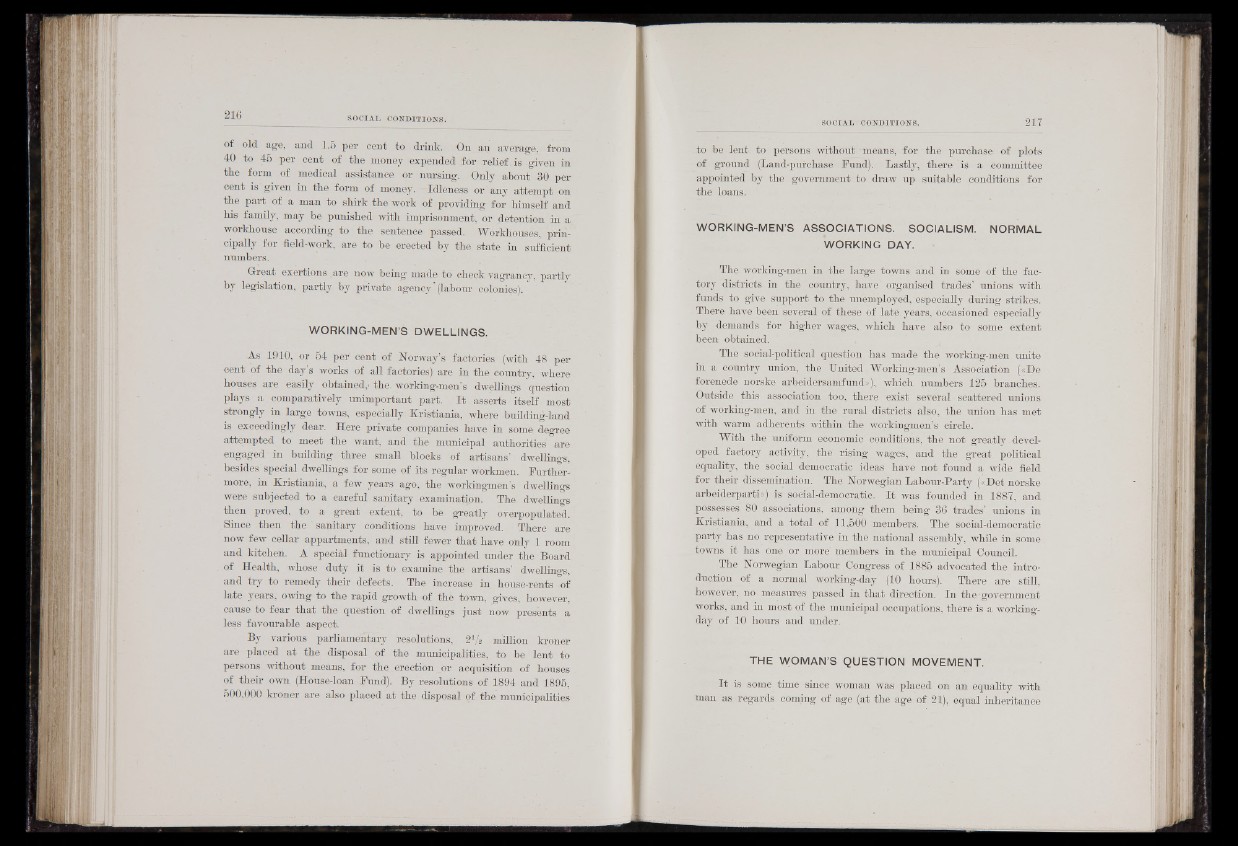
of old age, and 1.5 per cent to drink. On an average, from
40 to 45 per cent of the money expended for relief, is given in
the form of medical assistance or nursing. Only about 30 per
cent is given in the form of money. Idleness or any attempt on
the part of a man to shirk the work of providing for himself and
his family, may be punished with imprisonment, or detention in a
workhouse according to the sentence passed. Workhouses, principally
for field-work, are to be erected by the state in sufficient
numbers.
Great exertions are now being made to check vagrancy, partly
by legislation, partly by private agency' (labour colonies).
WORKING-MEN’S DWELLINGS.
As 1910, or 54 per' cent of Norway’s factories (with 48 per
cent of the day s works of all factories) are in the country, where
houses are easily obtained,1 the. working-men’s dwellings question
plays a comparatively unimportant part. I t asserts itself most
strongly in large towns, especially Kristiania, where building-land
is exceedingly dear. Here private companies have in some degree
attempted to meet the want, and the municipal authorities are
engaged in building three small blocks of artisans’ dwellings,
besides special dwellings for some of its regular workmen. Furthermore,
in Kristiania, a few years ago, the workingmen’s dwellings
were subjected to a careful sanitary examination. The dwellings
then proved, to a great extent, to be greatly overpopulated*
Since then the ‘ sanitary conditions have improved. There are
now few cellar appartments, and still fewer that have only 1 room
and kitchen. A special functionary is appointed under the Board
of Health, whose duty it is to examine the artisans’ dwellings,
and try to remedy their defects. The increase in house-rents of
late years, owing to the rapid growth of the town, gives, however
cause to fear that the question of dwellings just now presents a
less favourable aspect.
By various parliamentary resolutions, 2Vs million kroner
are placed at the disposal of the municipalities, to be lent to
persons without means, for th e , erection or acquisition of houses
of their own (House-loan .Fund). By resolutions of 1894 and 1895,
500,000 kroner are also placed at the disposal of the municipalities
to be lent, to persons without means, for the purchase of plots
of ground (Land-purchase Fund). Lastly, there is a committee
appointed by the government to draw up suitable conditions for
the loans.
WORKING-MEN’S ASSOCIATIONS. SOCIALISM. NORMAL
WORKING DAY.
The working-men in the large towns and in some of the factory
districts in the country,, have' organised trades’ unions with
funds to give support to the unemployed/especially during strikes.
There have been several of these of late, years, occasioned especially
by -demands for higher wages, which have also to some extent
been- obtained.
The social-political question has made the working-men unite
in a country union, the United Working-men’s Association («De
forenede norske arbeidersamfund»), which numbers 125 branches.
Outside this association too, there exist several scattered unions
of working-men, and in the rural districts also, the union has met
with warm adherents within the workingmen’s circle.
With the uniform economic conditions, the not greatly developed
factory activity, the rising wages, and the great political
equality, the social democratic ideas have not found a wide field
for their dissemination. The Norwegian Labour-Party («Det norske
arbeiderparti») is social-democratic. I t was founded in 1887, and
possesses 80 associations, among them being 36 trades’ unions in
Kristiania,. and a total of 11,50.0 members. The social-democratic
party has no representative in the national assembly, while in some
towns it has one or more members in the municipal Council.
The Norwegian Labour Congress of 1885 advocated the introduction
of a normal working-day (10 hours). There are still,
however, no measures passed in that direction. In the'government
works, and in most of the municipal occupations, there is a working-
day of 10 hours and under.
THE WOMAN’S QUESTION MOVEMENT.
I t is some time since woman was placed on an equality with
man as regards coming of age (at the age of 21), equal inheritance